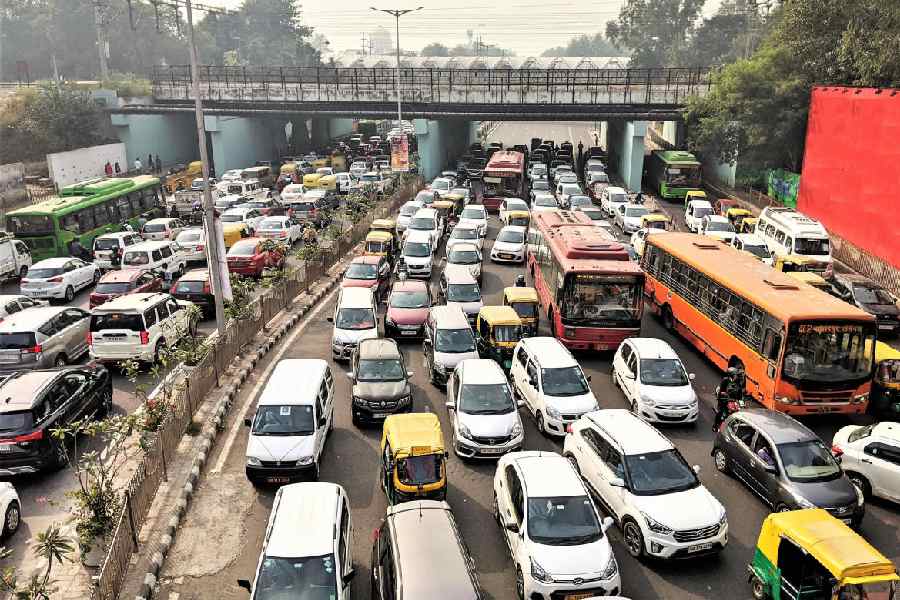Sound distraction
Sir — Vehicular noise is a public health hazard. Notably, the Union road transport and highways minister, Nitin Gadkari, has come up with a measure to provide succour to travellers. The government is planning to introduce a law banning conventional vehicle horns and mandating that only sounds inspired by Indian musical instruments be used instead. While the move is well-intentioned, the proposition of traditional music, such as the notes of a flute, replacing a vehicular horn, which quickly and effectively alerts people on roads to the safe navigation of traffic, defeats the purpose of a warning mechanism. One also wonders whether this is just another instance of the government offering bread and circuses to deflect attention from another persistent road nuisance — potholes.
Vidyut Das,
Delhi
Tap closed
Sir — After the deadly terrorist attack in Pahalgam, India suspended the Indus Waters Treaty with Pakistan (“Water off a duck’s back for neighbour”, April 25). The 1960 World Bank-brokered treaty, a hallmark of transboundary water cooperation, allocates the eastern rivers — Ravi, Beas, Sutlej — to India and the western rivers — Indus, Jhelum, Chenab — to Pakistan, with Pakistan receiving 80% of the Indus basin’s water. Pakistan, which is heavily reliant on the Indus system for irrigation, may face potential agricultural and economic instability as a result of the suspension.
However, experts note that India’s limited infrastructure restricts its potential to drastically alter water flows. Hence, immediate impacts may be limited. The IWT’s future hinges on diplomatic resolution between the two countries.
Chandan Kumar Nath,
Barpeta, Assam
Sir — The decision to suspend the IWT can be seen as India’s way of retaliating against Pakistan for orchestrating the Pahalgam attack. Even though the suspension may not immediately result in a water blockade, it will ensure that India does not remain bound by the treaty and that Pakistan is not able to monitor the projects on Indian rivers.
Further, Pakistan is currently going through its worst economic crisis. The suspension of the IWT and more retaliatory measures by India can dent Islamabad’s confidence.
Dattaprasad Shirodkar,
Mumbai
Sir — India’s so-called retributive step against Pakistan of suspending the IWT does not amount to much. Some television channels are airing a misconception that the stoppage of the Indus water will affect farming in Pakistan which will make India seem to have avenged the Pahalgam attack. Sadly, this is not the case. The impact of the suspension may take years to actualise. Indians must not be misled in this manner.
Monidipa Mitra,
Calcutta
Sir — The IWT has long served as a symbol of peace between India and Pakistan. Hence, the suspension of the treaty in light of the recent terror attack in Pahalgam is alarming. Water is the lifeblood of any nation and should never be used as a tool of political pressure. Treaties are binding under international law and must be upheld. Only dialogue can resolve the conflict between the two neighbours.
Mohammad Hasnain,
Mumbai
Sir — New Delhi’s move to suspend the IWT lacks diplomatic insight. India’s lack of storage infrastructure will prevent it from converting this diplomatic move into a strategy. Under the IWT, India has access to only 20% of the total volume of the Indus basin, making it dependent on small run-of-the-river projects like Kishanganga to meet the water and power demands of the Valley. Instead of suspension, India must leverage the situation to negotiate for better terms in the treaty.
Prasun Kumar Dutta,
West Midnapore
Sir — The IWT’s suspension was a powerful move against Pakistan. Bilawal Bhutto Zardari, the Pakistani politician, has warned that “Indian blood will flow” if the flow of Indus water is stopped. This underscores the potency of India’s move.
Birkha Khadka Duvarseli,
Siliguri
Facts unchecked
Sir — In the last two decades, being a YouTuber, which entails uploading videos on the video-sharing platform and earning profit by amassing a subscriber base, has evolved into a viable profession (“Ways of seeing”, April 27). However, YouTube lacks fact-checking mechanisms and safeguards against potentially harmful content. In this respect, the editorial and regulatory oversights in television make it a more reliable visual medium.
Sukhendu Bhattacharjee,
Hooghly
Sir — YouTube needs to instal a content-verification mechanism, especially at a time when generative Artificial Intelligence videos have taken over the internet.
Fateh Najamuddin,
Lucknow
Class division
Sir — It is often found that students hailing from rich families tend to show off their wealth and taunt their classmates coming from humble backgrounds. Their ordinary school supplies are made fun of by their rich peers. Parents must inculcate good values in their wards to check class intolerance.
Sujit De,
Calcutta
Temple politics
Sir — Politics in West Bengal currently seems to be dominated by temples. While the chief minister, Mamata Banerjee, is set to inaugurate the Jagannath temple in Digha in East Midnapore, the leader of the Opposition, Suvendu Adhikari, recently laid the foundation stone of a Ram temple at Sonachura, located in the same district. Both the Trinamool Congress and the Bharatiya Janata Party are exploiting religious sentiments to gain electoral dividends.
Murtaza Ahmad,
Calcutta










